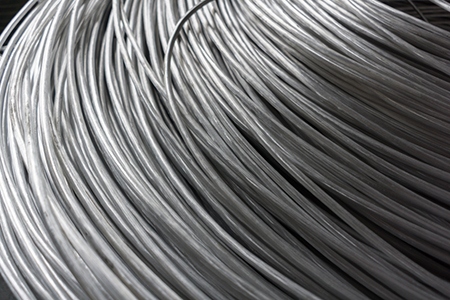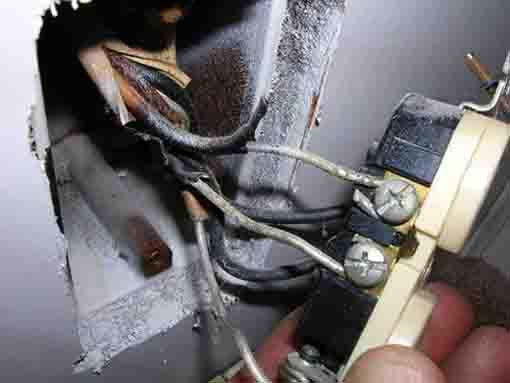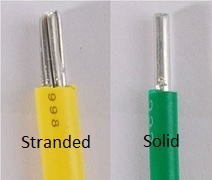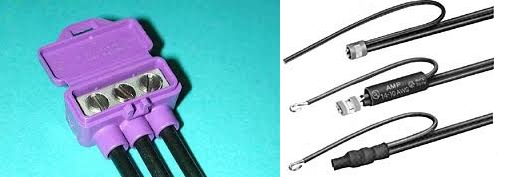One item that is sure to cause concern during an inspection is the presence of aluminum wiring in the home. This paper will attempt to provide some additional information on the subject of aluminum wiring.

HISTORY
Since the advent of powering our homes with electricity, wiring has traditionally been copper. In the mid 1960’s, as the price of copper rose, aluminum was introduced as a more cost effective alternative. While not as effective in the conduction of electricity, with some adjustments to installation procedures aluminum wiring worked its way into our homes.
ADJUSTMENTS
Some modifications were made in an attempt to have the aluminum perform in a similar manner to copper. Metals tend to oxidize (rust) when in contact with oxygen. Each metal’s rust reacts differently, and aluminum tends to develop an oxide coating which does not effectively conduct electricity. This can cause overheating, which can develop into a fire concern. Modern aluminum wire installations are protected from oxidation by coating the exposed wire with a joint compound that helps to prevent oxidation. Aluminum expands and contracts more than copper does when it heats up from the flow of electricity. This can cause the connections (at switches, outlets, fixtures, breakers, etc.) to become loose, which can lead to overheating. Push-in connections at fixtures are typically not allowed with aluminum wiring, as the wires must be held in place by screw connections. Aluminum is softer than copper, and additional care must be taken during installation to not damage (crush, nick or cut) the wire. Since copper is a better conductor than aluminum, aluminum wiring is required to be larger than copper to safely conduct the same amount of electricity.

SOLID VS STRANDED WIRE
There are two different types of aluminum wiring that are found in homes: solid and stranded. Solid wires are one piece of wire, and are typically found on the lower amperage (15A & 20A) 120V circuits in the home. Stranded wires are multiple pieces of wire bundled together to form a larger wire, and are typically found on the higher amperage (>25A) 240V circuits in the home. Solid wire is not commonly used in residential construction nowadays, but stranded aluminum wire is quite common, and properly installed is considered safe for residential use.

INSURANCE
The biggest concern with aluminum wiring is the effect that it may have on your ability to secure insurance coverage on your home. All insurance companies are different, and have different guidelines regarding the presence of solid aluminum wiring in your home. Our recommendation is that you seek the advice of your insurance agent prior to purchasing your home. Some companies choose not to insure houses with solid aluminum wiring, and some will insure them but charge a higher rate, and some will insure them if their protocol is followed regarding inspection of the wiring system. Be sure to verify your insurance options as soon as possible.
REPAIRS
There are a variety of opinions among electricians and electrical engineers regarding the proper methods of addressing the presence of aluminum wiring in the home. However, according to the Consumer Products Safety Commission (CPSC), the most recent (as of this writing) approved methods of repair of solid aluminum wiring are as follows:
1) complete replacement of the wire in question
2) “pigtailing” the wires using a COPALUM connector
3) “pigtailing” the wires using an AlumiConn connector

Electrical systems installed between approximately 1965 and the mid 70’s have the possibility of containing solid aluminum wire. The presence of solid aluminum wiring in your home is an item that home inspectors are required to notify you about in the inspection report, due to possible concerns. If you have solid aluminum wire in your home (or the home that you are considering purchasing), it is highly recommended that you consult with your real estate agent, your insurance company and a licensed electrician to determine your best plan of action.
Additional information on this topic is available from the CPSC:
Click to download Publication 516 – Repairing Aluminum Wiring
Note that all electrical repairs should be performed
only by a qualified and licensed electrician.
Please Share this Post!
I thoroughly enjoy creating these posts for you, the reader. Please take a moment to comment, letting me know what you think about the topic, and passing along any of your knowledge to our community. Please feel free to get in touch with me, letting me know if you have any specific topics that you would like to see covered on the site. And please feel free to share this content with your friends. The more people that we can help in their careers, the better!
Thanks, Joseph
